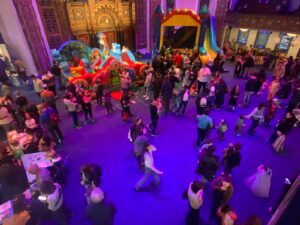
Esther Didn’t Stand Alone and Neither Do We
When I’m asked if I always wanted to be a rabbi, I give the same answer: I didn’t really know I could be a rabbi when I was a kid; I thought you had to be a bearded, middle-aged man to be a rabbi, and I didn’t see that in my future. The me of 20 years ago would be gobsmacked to learn that not only am I rabbi, but many of my closest colleagues are female rabbis who lift me up and support me, and who help make this incredibly vibrant, spiritual, and loving community thrive. When I was ordained in May of 2020, I was terrified to be stepping into spiritual leadership in such a scary, uncertain time. Five years later, the world only feels more scary and uncertain, but I feel so blessed to be part of a loving, connected, supportive community that makes the work and the world not only bearable, but often fun.
 On Saturday night, we held the annual Torah unrolling ceremony for students beginning their B-Mitzvah journey at BJ. As the Torah wrapped around the Sanctuary, I turned to Felicia with tears in my eyes, awed that this same beautiful room could have been filled with joy for a B-Mitzvah in the morning, this precious ritual at night, and the next morning would be filled with bouncy castles and games and the gleeful shouts of kids at the Purim Carnival. The carnival was a beautiful, chaotic blur of happy kids, held together by the incredible Family Life and Learning team. When my energy was flagging, Becca stepped in to take over for me so I could take a break; all around me, my colleagues were supporting and being supported by each other, parents, and lay leaders.
On Saturday night, we held the annual Torah unrolling ceremony for students beginning their B-Mitzvah journey at BJ. As the Torah wrapped around the Sanctuary, I turned to Felicia with tears in my eyes, awed that this same beautiful room could have been filled with joy for a B-Mitzvah in the morning, this precious ritual at night, and the next morning would be filled with bouncy castles and games and the gleeful shouts of kids at the Purim Carnival. The carnival was a beautiful, chaotic blur of happy kids, held together by the incredible Family Life and Learning team. When my energy was flagging, Becca stepped in to take over for me so I could take a break; all around me, my colleagues were supporting and being supported by each other, parents, and lay leaders.
This web of community is exactly how I imagine Esther’s experience in the Shushan palace. When King Ahasverosh’s courtiers call for all the beautiful young women to gather and prepare to be presented to the King, our story jumps right into how Esther, our heroine, fared. But I cannot help but think about the hundreds, maybe thousands, of other women gathered with her, each preparing to go before the king.
 Surely some of the other women would have been jealous, or competitive, or petty. But I cannot imagine that the story in the Megillah is, well, “the whole megillah.” If the women around Esther are anything like my friends and colleagues, the women’s harem was filled with coos and cheers and the sounds of women hyping each other up. The harem wasn’t just the place the women went to be out of sight when they weren’t summoned by the king; the harem was the place where women could support each other so that they all had the courage to appear before the king as their most glorious selves.
Surely some of the other women would have been jealous, or competitive, or petty. But I cannot imagine that the story in the Megillah is, well, “the whole megillah.” If the women around Esther are anything like my friends and colleagues, the women’s harem was filled with coos and cheers and the sounds of women hyping each other up. The harem wasn’t just the place the women went to be out of sight when they weren’t summoned by the king; the harem was the place where women could support each other so that they all had the courage to appear before the king as their most glorious selves.
Confident, effective leaders are made by supportive communities. We read about Mordekhai’s counsel to Esther, yes, but anyone blessed enough to have a community of friends and colleagues will know that Esther was probably surrounded by so many other loving voices. As I picture Esther appearing before the king, asking him to save her people, I imagine that she was also cloaked in the love and support of the friends she must have made, head held high on the confidence they helped instill in her.
We often refer to the Purim story as being about a world turned topsy-turvy, because of a line at the end of the Megillah: “On the day when the the enemies of the Jewish people thought to overpower them, things were turned on their head, and the Jews overpowered their enemies.” The way this plays out in the Megillah is horrifying, with the Jews of Persia murdering tens of thousands of people in a gory revenge fantasy. In this moment when so many people and programs are threatened by government actions, I hope we are not swayed by the Megillah’s idea of punching back harder. The opposite of being attacked does not have to be going on the attack. To survive my fear and anger at the current moment, I’m finding myself drawn to knit myself even deeper into relationships with the amazing spiritual leaders, staff, and community members at BJ.
Instead of meeting hate with hate, or hiding and hoping things blow over, I hope we do things Esther’s way. I hope we surround ourselves with amazing people: leaders and mentors we admire, colleagues who share our visions and want to work on them together, and peers who ask how they can step up to hold us, and who trust us to hold them. And I hope the support of the community allows each of us to be brave enough to step up when we’re needed, knowing that the people around us believe in us.
Shabbat shalom,

Rabbi Deena Cowans

